455 start with I start with I


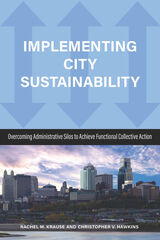
Implementing City Sustainability examines the structures and processes that city governments employ to pursue environmental, social, and economic well-being within their communities. As American cities adopt sustainability objectives, they are faced with the need to overcome fuzzy-boundary, coordination, and collective action challenges to achieve successful implementation.
Sustainability goals often do not fit neatly into traditional city government structures, which tend to be organized around specific functional responsibilities, such as planning, public works, parks and recreation, and community development. The authors advance a theory of Functional Collective Action and apply it to local sustainability to explain how cities can—and in some cases do—organize to successfully administer changes to achieve complex objectives that transcend these organizational separations. Implementing City Sustainability uses a mixed-method research design and original data to provide a national overview of cities’ sustainability arrangements, as well as eight city case studies highlighting different means of organizing to achieve functional collective action.
By focusing not just on what cities are doing to further sustainability, but also on how they are doing it, the authors show how administrative structure enables—or inhibits—cities to overcome functional divides and achieve successful outcomes.
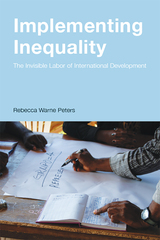

Over the past three decades, governments at the local, state, and federal levels have undertaken a wide range of bold innovations, often in partnership with nongovernmental organizations and communities, to try to address their environmental and natural resource management tasks. Many of these efforts have failed. Innovations, by definition, are transitory. How, then, can we establish new practices that endure?
Toddi A. Steelman argues that the key to successful and long-lasting innovation must be a realistic understanding of the challenges that face it. She examines three case studies—land management in Colorado, watershed management in West Virginia, and timber management in New Mexico—and reveals specific patterns of implementation success and failure. Steelman challenges conventional wisdom about the role of individual entrepreneurs in innovative practice. She highlights the institutional obstacles that impede innovation and its longer term implementation, while offering practical insight in how enduring change might be achieved.
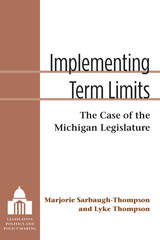
In Implementing Term Limits, Marjorie Sarbaugh-Thompson and Lyke Thompson bring thirteen years of intensive research and 460 interviews to assess changes since Michigan’s implementation of term limits in 1993 and explore their implications. Paying special attention to term limits’ institutional effects, they also consider legislative representation, political accountability, and the role of the bureaucracy and interest groups in state legislatures.
Their thorough study suggests that legislators are less accessible to officials and that there is a larger gap between legislators and their voters. Moreover, legislators become much more politically ambitious after term limits and spend more time on political activities. The selection of top chamber leaders is complicated by newcomers’ lack of knowledge about and experience working with the leaders they elect before being sworn in. As a result, term limits in Michigan fail to deliver on many of the “good government” promises that appeal to citizens.
Implementing Term Limits makes a unique and valuable contribution to the debate over the best means by which to obtain truly democratic institutions.

Implementing the Endangered Species Act on the Platte Basin Water Commons tells of the negotiations among the U.S. Department of the Interior, the environmental community, and the states of Wyoming, Colorado, and Nebraska that took place from the mid-1970s to 2006. Ambitious talks among rival water users, environmentalists, state authorities, and the Department of the Interior finally resulted in the Platte River Habitat Recovery Program.
Documenting how organizational interests found remedies within the conditions set by the Endangered Species Act, describing how these interests addressed habitat restoration, and advancing sociological propositions under which water providers transcended self-interest and produced an agreement benefiting the environment, this book details the messy process that took place over more than thirty years. Presenting important implications for the future of water management in arid and semi-arid environments, this book will be of interest to anyone involved in water management, as well as academics interested in the social organization of common property.


In showing how political projects and alliances in Puerto Rico were affected by racially contingent definitions of “decency” and “disreputability,” Findlay argues that attempts at moral reform and the state’s repression of “sexually dangerous” women were weapons used in batttles between elite and popular, American and Puerto Rican, and black and white. Based on a thorough analysis of popular and elite discourses found in both literature and official archives, Findlay contends that racialized sexual norms and practices were consistently a central component in the construction of social and political orders. The campaigns she analyzes include an attempt at moral reform by elite male liberals and a movement designed to enhance the family and cleanse urban space that ultimately translated into repression against symbollically darkened prostitutes. Findlay also explores how U.S. officials strove to construct a new colonial order by legalizing divorce and how feminist, labor, and Afro-Puerto Rican political demands escalated after World War I, often focusing on the rehabilitation and defense of prostitutes.
Imposing Decency forces us to rethink previous interpretations of political chronologies as well as reigning conceptualizations of both liberalism and the early working-class in Puerto Rico. Her work will appeal to scholars with an interest in Puerto Rican or Latin American studies, sexuality and national identity, women in Latin America, and general women’s studies.
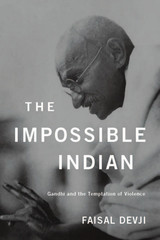
The Impossible Indian offers a rare, fresh view of Gandhi as a hard-hitting political thinker willing to countenance the greatest violence in pursuit of a global vision that went far beyond a nationalist agenda. Revising the conventional view of the Mahatma as an isolated Indian moralist detached from the mainstream of twentieth-century politics, Faisal Devji offers a provocative new genealogy of Gandhian thought, one that is not rooted in a clichéd alternative history of spiritual India but arises from a tradition of conquest and violence in the battlefields of 1857.
Focusing on his unsentimental engagement with the hard facts of imperial domination, Fascism, and civil war, Devji recasts Gandhi as a man at the center of modern history. Rejecting Western notions of the rights of man, rights which can only be bestowed by a state, Gandhi turned instead to the idea of dharma, or ethical duty, as the true source of the self’s sovereignty, independent of the state. Devji demonstrates that Gandhi’s dealings with violence, guided by his idea of ethical duty, were more radical than those of contemporary revolutionists.
To make sense of this seemingly incongruous relationship with violence, Devji returns to Gandhi’s writings and explores his engagement with issues beyond India’s struggle for home rule. Devji reintroduces Gandhi to a global audience in search of leadership at a time of extraordinary strife as a thinker who understood how life’s quotidian reality could be revolutionized to extraordinary effect.
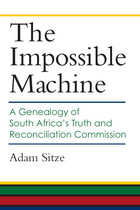
Adam Sitze meticulously traces the origins of South Africa’s Truth and Reconciliation Commission back to two well-established instruments of colonial and imperial governance: the jurisprudence of indemnity and the commission of inquiry. This genealogy provides a fresh, though counterintuitive, understanding of the TRC’s legal, political, and cultural importance. The TRC’s genius, Sitze contends, is not the substitution of “forgiving” restorative justice for “strict” legal justice but rather the innovative adaptation of colonial law, sovereignty, and government. However, this approach also contains a potential liability: if the TRC’s origins are forgotten, the very enterprise intended to overturn the jurisprudence of colonial rule may perpetuate it. In sum, Sitze proposes a provocative new means by which South Africa’s Truth and Reconciliation Commission should be understood and evaluated.
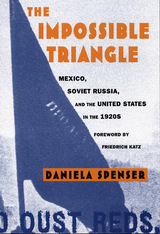
Based on documents from the archives of several nations—including reports by former Mexican diplomats in Moscow that have never before been studied—the book analyzes the Mexican government’s motivation for establishing relations with the Soviet Union in the face of continued imperialist pressure and harsh opposition from the United States. After explaining how Mexico established diplomatic ties with the Soviet Union in 1924 in an attempt to broaden the spectrum of its alliances after several years of uneven relations with the United States, Spenser reveals the troubled nature of the relationship that ensued. Soviet policy toward Mexico was characterized by a series of profound contradictions, varying from neglect to strong involvement in Mexican politics and the belief that Mexico could become a center of world revolution. Working to resolve and explain these contradictions, Spenser explores how, despite U.S. objections to Mexico’s relations with the Soviet Union, Mexico continued its association with the Soviets until the United States adopted the Good Neighbor Policy and softened its stance toward Mexico’s revolutionary program after 1927.
With a foreword by Friedrich Katz and illustrated by illuminating photographs, The Impossible Triangle contributes to an understanding of the international dimension of the Mexican revolution. It will interest students and scholars of history, revolutionary theory, political science, diplomacy, and international relations.
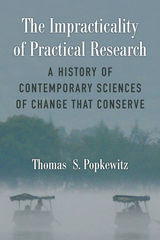
There is an alluring desire that research should lead us to find the practical knowledge that enables people to live a good life in a just and equitable society. This desire haunted the 19th century emergence of the social sciences as a discipline, then became more pronounced in the postwar mobilizations of research. Today that desire lives on in the international assessments of national schools and in the structure of professional education, both of which influence government modernization of schools and also provide for people’s well-being. American policy thus reflects research in which reforms are verified by “scientific, empirical evidences” about “what works” in experiments, and “will work” therefore in society.
The book explores the idea that practical and useful knowledge changes over time, and shows how this knowledge has been (re)visioned in contemporary research on educational reform, instructional improvement, and professionalization. The study of science draws on a range of social and cultural theories and historical studies to understand the politics of science, as well as scientific knowledge that is concerned with social and educational change. Research hopes to change social conditions to create a better life, and to shape people whose conduct embodies these valued characteristics—the good citizen, parent, or worker. Yet this hope continually articulates the dangers that threaten this future. Thomas Popkewitz explores how the research to correct social wrongs is paradoxically entangled with the inscription of differences that ultimately hamper the efforts to include.

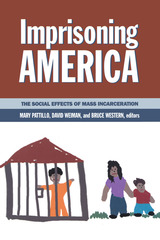
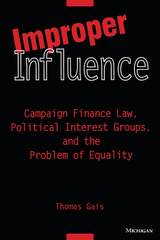
Thomas L. Gais points out that many laws that regulate group involvement in elections ignore the real difficulties of political mobilization, and he concludes that PACs and the campaign finance laws reflect a fundamental discrepancy between grassroots ideals and the ways in which broadly based groups actually get organized.
". . . . of fundamental scholarly and practical importance. The implications for 'reform' are controversial, flatly contradicting other recent reform proposals . . . . I fully expect that Improper Influence will be one of the most significant books on campaign finance to be published in the 1990s." --Michael Munger, Public Choice
"It is rare to find a book that affords a truly fresh perspective on the role of special interest groups in the financing of U.S. elections. It is also uncommon to find a theoretically rigorous essay confronting a topic usually grounded in empirical terms. . . . Improper Influence scores high on both counts and deserves close attention from students of collective action, campaign finance law, and the U.S. political process more generally." --American Political Science Review
Thomas L. Gais is Senior Fellow, The Nelson A. Rockefeller Institute of Government, State University of New York.
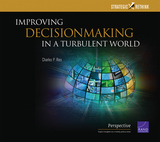

Policymakers and public managers around the world have become preoccupied with the question of how their goals can be achieved in a way that rebuilds public confidence in government. Yet because public policies and programs increasingly are being administered through a complicated web of jurisdictions, agencies, and public-private partnerships, evaluating their effectiveness is more difficult than in the past. Though social scientists possess insightful theories and powerful methods for conducting empirical research on governance and public management, their work is too often fragmented and irrelevant to the specific tasks faced by legislators, administrators, and managers.
Proposing a framework for research based on the premise that any particular governance arrangement is embedded in a wider social, fiscal, and political context, Laurence E. Lynn Jr., Carolyn J. Heinrich, and Carolyn J. Hill argue that theory-based empirical research, when well conceived and executed, can be a primary source of fundamental, durable knowledge about governance and policy management. Focusing on complex human services such as public assistance, child protection, and public education, they construct an integrative, multilevel "logic of governance," that can help researchers increase the sophistication, power, and relevance of their work.

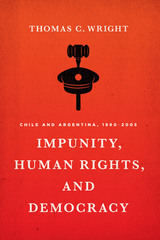
Universal human rights standards were adopted in 1948, but in the 1970s and 1980s, violent dictatorships in Argentina and Chile flagrantly defied the new protocols. Chilean general Augusto Pinochet and the Argentine military employed state terrorism in their quest to eradicate Marxism and other forms of “subversion.” Pinochet constructed an iron shield of impunity for himself and the military in Chile, while in Argentina, military pressure resulted in laws preventing prosecution for past human rights violations. When democracy was reestablished in both countries by 1990, justice for crimes against humanity seemed beyond reach.
Thomas C. Wright examines how persistent advocacy by domestic and international human rights groups, evolving legal environments, unanticipated events that impacted public opinion, and eventual changes in military leadership led to a situation unique in the world—the stripping of impunity not only from a select number of commanders of the repression but from all those involved in state terrorism in Chile and Argentina. This has resulted in trials conducted by national courts, without United Nations or executive branch direction, in which hundreds of former repressors have been convicted and many more are indicted or undergoing trial.
Impunity, Human Rights, and Democracy draws on extensive research, including interviews, to trace the erosion and collapse of the former repressors’ impunity—a triumph for human rights advocates that has begun to inspire authorities in other Latin American countries, including Peru, Uruguay, Brazil, and Guatemala, to investigate past human rights violations and prosecute their perpetrators.

A pioneering scholar of gay history, John D’Emilio reflects in this wide-ranging collection of essays upon the social, cultural, and political changes provoked by LGBT activism. He offers provocative questions and historical analyses: What can we learn from a life-long activist like Bayard Rustin, who questioned the wisdom of “identity politics”? Was Richard Nixon a “gay liberationist”? How can knowing local stories—like those of Chicago in the 1950s, 1960s, and 1970s—help build stronger communities and enrich traditions of activism? Might the focus on achieving actually be evidence of growing conservatism in LGBT communities?
In a New Century provides a dynamic, thoughtful, and important resource for identifying changes that have occurred in the United States since 1960, taking stock of the work that still needs to be done, and issuing an urgent call to action for getting there.
Best Books for General Audiences, selected by the American Association of School Librarians
Best Special Interest Books, selected by the Public Library Reviewers
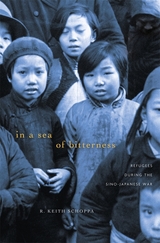
The Japanese invasion of Shanghai in 1937 led some thirty million Chinese to flee their homes in terror, and live—in the words of artist and writer Feng Zikai—“in a sea of bitterness” as refugees. Keith Schoppa paints a comprehensive picture of the refugee experience in one province—Zhejiang, on the central Chinese coast—where the Japanese launched major early offensives as well as notorious later campaigns. He recounts stories of both heroes and villains, of choices poorly made amid war’s bewildering violence, of risks bravely taken despite an almost palpable quaking fear.
As they traveled south into China’s interior, refugees stepped backward in time, sometimes as far as the nineteenth century, their journeys revealing the superficiality of China’s modernization. Memoirs and oral histories allow Schoppa to follow the footsteps of the young and old, elite and non-elite, as they fled through unfamiliar terrain and coped with unimaginable physical and psychological difficulties. Within the context of Chinese culture, being forced to leave home was profoundly threatening to one’s sense of identity. Not just people but whole institutions also fled from Japanese occupation, and Schoppa considers schools, governments, and businesses as refugees with narratives of their own.
Local governments responded variously to Japanese attacks, from enacting scorched-earth policies to offering rewards for the capture of plague-infected rats in the aftermath of germ warfare. While at times these official procedures improved the situation for refugees, more often—as Schoppa describes in moving detail—they only deepened the tragedy.

Focusing on the human element of marine conservation and the extractive industry in Tanzania, this volume illuminates what happens when impoverished people living in underdeveloped regions of Africa are suddenly subjected to state-directed conservation and natural resource extraction projects, implemented in their landscapes of subsistence. In a Wounded Land draws on ethnographically rich case studies and vignettes collected over a ten-year period in several coastal villages on Tanzania’s southeastern border with Mozambique. In seven chapters, the book demonstrates how state power, processes of displacement and dispossession, forms of local resistance and acquiescence, environmental and social justice, and human well-being become interconnected.
Written in lucid, accessible language, this is the first book that reveals the social implications of the co-presence of a marine park and a gas project at a time when internationally funded conservation initiatives and extraction projects among rural African populations are engendering rapid social transformation.
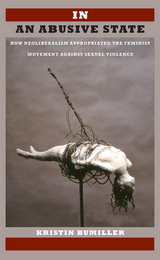
Drawing on archival research, individual case studies, testimonies of rape victims, and interviews with battered women, Bumiller raises fundamental concerns about the construction of sexual violence as a social problem. She describes how placing the issue of sexual violence on the public agenda has polarized gender- and race-based interests. She contends that as the social welfare state has intensified regulation and control, the availability of services for battered women and rape victims has become increasingly linked to their status as victims and their ability to recognize their problems in medical and psychological terms. Bumiller suggests that to counteract these tendencies, sexual violence should primarily be addressed in the context of communities and in terms of its links to social disadvantage. In an Abusive State is an impassioned call for feminists to reflect on how the co-optation of their movement by the neoliberal state creates the potential to inadvertently harm impoverished women and support punitive and racially based crime control efforts.
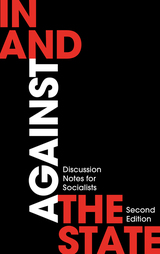
Originally published as a pamphlet in 1979 and again by Pluto in 1980, In and Against the State brought together questions of working-class struggle and state power, exploring how revolutionary socialists might reconcile working in the public sector with their radical politics. Informed by autonomist political ideas and practices that were central to the protests of 1968, the book’s authors spoke to a generation of activists wrestling with the question of where to place their energies.
Forty years have passed, yet the questions it posed are still to be answered. As the eclipse of Corbynism and the onslaught of the global pandemic have demonstrated with brutal clarity, a renewed socialist strategy is needed more urgently than ever.
This edition includes a new introduction by Seth Wheeler and an interview with John McDonnell that reflect on the continuing relevance of In and Against the State and the questions it raises.
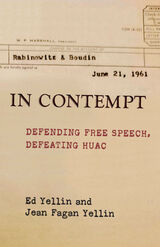
So began a decade of hardship for Ed and Jean Yellin and their three young children as the repressive weight of the U.S. government, caught up in the throes of McCarthyism, crashed down upon their careers, their daily household budget, and their relationships to colleagues, neighbors, and their country. In Contempt is a faithful, factual testament to the enduring quality of patriotic dissent in our evolving democracy—and a loving reconstruction of what it meant to be labeled “unAmerican” for defending the Constitution.


This updated comprehensive history of the American Civil Liberties Union recounts the ACLU's stormy history since its founding in 1920 to fight for free speech and explores its involvement in some of the most famous causes in American history, including the Scopes "monkey trial," the internment of Japanese Americans during World War II, the Cold War anti-Communist witch hunts, and the civil rights movement. The new introduction covers the history of the organization and developments in civil liberties in the 1990s, including the U.S. Supreme Court's declaration of the Communications Decency Act as unconstitutional in ACLU v. Reno.
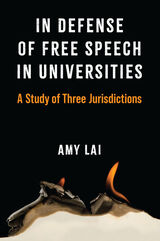
In this book, Amy Lai examines the current free speech crisis in Western universities. She studies the origin, history, and importance of freedom of speech in the university setting, and addresses the relevance and pitfalls of political correctness and microaggressions on campuses, where laws on harassment, discrimination, and hate speech are already in place, along with other concepts that have gained currency in the free speech debate, including deplatforming, trigger warning, and safe space. Looking at numerous free speech disputes in the United Kingdom, the United States, and Canada, the book argues for the equal application of the free speech principle to all expressions to facilitate respectful debates. All in all, it affirms that the right to free expression is a natural right essential to the pursuit of truth, democratic governance, and self-development, and this right is nowhere more important than in the university.

In Defense of Negativity, Geer’s study of negative advertising in presidential campaigns from 1960 to 2004, asserts that the proliferating attack ads are far more likely than positive ads to focus on salient political issues, rather than politicians’ personal characteristics. Accordingly, the ads enrich the democratic process, providing voters with relevant and substantial information before they head to the polls.
An important and timely contribution to American political discourse, In Defense of Negativity concludes that if we want campaigns to grapple with relevant issues and address real problems, negative ads just might be the solution.

Debates continue to rage over the merits or flaws of public land and whether or not it should be privatized—or at least, radically reconfigured in some way. In Defense of Public Lands offers a comprehensive refutation of the market-oriented arguments. Steven Davis passionately advocates that public land ought to remain firmly in the public’s hands. He reviews empirical data and theoretical arguments from biological, economic, and political perspectives in order to build a case for why our public lands are an invaluable and irreplaceable asset for the American people.
In Defense of Public Lands briefly lays out the history and characteristics of public lands at the local, state, and federal levels while examining the numerous policy prescriptions for their privatization or, in the case of federal lands, transfer. He considers the dimensions of environmental health; markets and valuation of public land, the tensions between collective values and individual preferences, the nature and performance of bureaucratic management, and the legitimacy of interest groups and community decision-making. Offering a fair, good faith overview of the privatizers’ best arguments before refuting them, this timely book contemplates both the immediate and long-term future of our public lands.
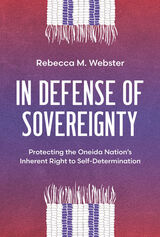
As in so many conflicts between Indigenous nations and local municipalities, the media narrative about the Oneida Nation’s battle for sovereignty has been dominated by the local government’s standpoint. In Defense of Sovereignty offers another perspective, that of a nation citizen directly involved in the litigation, augmented by contributions from historians, attorneys, and a retired nation employee. It makes an important contribution to public debates about the inherent right of Indigenous nations to continue to exist and exercise self-governance within their territories without being challenged at every turn.
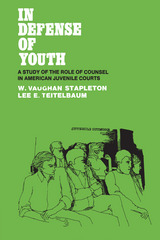

The Patrons of Husbandry—or the Grange—is the longest-lived US agricultural society and, since its founding shortly after the Civil War, has had immeasurable influence on social change as enacted by ordinary Americans. The Grange sought to relieve the struggles of small farmers by encouraging collaboration. Pathbreaking for its inclusion of women, the Grange is also well known for its association with Gilded Age laws aimed at curbing the monopoly power of railroads.
In Essentials, Unity takes as its focus Grange founder Oliver Kelley and his home organization in Minnesota. Jenny Bourne draws upon numerous historical records to present a lively picture of a fraternal organization devoted to improving the lot of farmers but whose legacies extend far beyond agriculture. From struggles over minimum wage, birth control, and environmental regulation to the conflicts surrounding the Affordable Care Act, and from lunch-counter sit-ins to Occupy Wall Street, the Grange has shaped the very notion of collective action and how it is deployed even today. As this compact book so effectively illustrates, the history of the Patrons of Husbandry exposes the classic tension between the desires for achieving overall economic success and determining how the spoils are split.
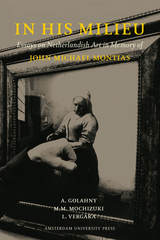
Gathered in honor of John Michael Montias (1928–2005), the foremost scholar on Johannes Vermeer and a pioneer in the study of the socioeconomic dimensions of art, the essays in In His Milieu are an essential contribution to the study of the social functions of making, collecting, displaying, and donating art. The nearly forty essays here by—all internationally recognized experts in the fields of art history and the economics of art—are especially revealing about the Renaissance and Baroque eras and present new material on such artists as Rembrandt, Van Eyck, Rubens, and da Vinci.

Finalist for the 2015 Aidoo-Snyder Prize
In Idi Amin’s Shadow is a rich social history examining Ugandan women’s complex and sometimes paradoxical relationship to Amin’s military state. Based on more than one hundred interviews with women who survived the regime, as well as a wide range of primary sources, this book reveals how the violence of Amin’s militarism resulted in both opportunities and challenges for women. Some assumed positions of political power or became successful entrepreneurs, while others endured sexual assault or experienced the trauma of watching their brothers, husbands, or sons “disappeared” by the state’s security forces. In Idi Amin’s Shadow considers the crucial ways that gender informed and was informed by the ideology and practice of militarism in this period. By exploring this relationship, Alicia C. Decker offers a nuanced interpretation of Amin’s Uganda and the lives of the women who experienced and survived its violence.
Each chapter begins with the story of one woman whose experience illuminates some larger theme of the book. In this way, it becomes clear that the politics of military rule were highly relevant to women and gender relations, just as the politics of gender were central to militarism. By drawing upon critical security studies, feminist studies, and violence studies, Decker demonstrates that Amin’s dictatorship was far more complex and his rule much more strategic than most observers have ever imagined.

In Lady Liberty’s Shadow examines popular white perceptions of danger represented by immigrants and their children, as well the specter that lurks at the edges of suburbs in the shape of black and Latino urban underclasses and the ever more nebulous hazard of (presumed-Islamic) terrorism that threatening to undermine “life as we know it.” Robyn Magalit Rodriguez explores the impact of anti-immigrant municipal ordinances on a range of immigrant groups living in varied suburban communities, from undocumented Latinos in predominantly white suburbs to long-established Asian immigrants in “majority-minority” suburbs. The “American Dream” that suburban life is supposed to represent is shown to rest on a racialized, segregated social order meant to be enjoyed only by whites. Although it is a case study of New Jersey, In Lady Liberty’s Shadow offers crucial insights that can shed fresh light on the national immigration debate.
For more information, go to: https://www.facebook.com/inlibertysshadow



The collective memories of Nazism that developed in postwar Germany have helped define a new paradigm of memory politics. From Europe to South Africa and from Latin America to Iraq, scholars have studied the German case to learn how to overcome internal division and regain international recognition.
In Pursuit of German Memory: History, Television, and Politics after Auschwitz examines three arenas of German memory politics—professional historiography, national politics, and national public television—that have played key roles in the reinvention of the Nazi past in the last sixty years. Wulf Kansteiner shows that the interpretations of the past proposed by historians, politicians, and television producers reflect political and generational divisions and an extraordinary concern for Germany's image abroad. At the same time, each of these theaters of memory has developed its own dynamics and formats of historical reflection.
Kansteiner’s analysis of the German scene reveals a complex social geography of collective memory. In Pursuit of German Memory underscores the fact that German memories of Nazism, like many other collective memories, combine two seemingly contradictory qualities: They are highly mediated and part of a global exchange of images and story fragments but, at the same time, they can be reproduced only locally, in narrowly circumscribed networks of communication.

Starting with the whaling routes that first connected the mid-Atlantic archipelago with the ports of call in New England and California in the early 1800s, Williams lays out the complex relationship between the Azores and the US that has continued into the present. We learn how particular patterns of poverty, overpopulation and social inequality in the Azores pushed large numbers of the islands' inhabitants to leave their homes in search of better opportunities for themselves and their children. He tells the story of how the early whalers who jumped ship in New Bedford, San Francisco, or Hawaii were followed by kin and fellow villagers who had heard of plentiful jobs in New England's textile mills, gold and land in California, or agricultural work on Hawaiian plantations. Williams' account allows us to understand the importance of family and community connections throughout the immigrants' arduous transition from peasant life to industrial society.
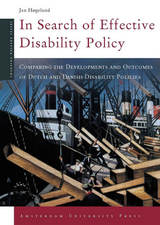

The recent spate of books and articles reflecting on the question of evil might make one forget that the question of just what constitutes goodness is no less urgent or perplexing. Everyone wants to think of him- or herself as good. But what does a good life look like? And how do people become good? Are there multiple, competing possibilities for what counts as a good life, all equally worthy? Or, is there a unified and transcendent conception of the good that should guide our judgment of the possibilities? What does a good life look like when it is guided by God? How is a good life involved with the lives of others? And, finally, how good is good enough?
These questions are the focus of In Search of Goodness, the product of a year-long conversation about goodness. The eight essays in this volume challenge the dichotomies that usually govern how goodness has been discussed in the past: altruism versus egoism; reason versus emotion; or moral choice versus moral character. Instead, the contributors seek to expand the terms of the discussion by coming at goodness from a variety of perspectives: psychological, philosophic, literary, religious, and political. In each case, they emphasize the lived realities and particulars of moral phenomena, taking up examples and illustrations from life, literature, and film. From Achilles and Billy Budd, to Oskar Schindler and Shel Silverstein’s The Giving Tree, to Iris Murdoch and the citizens of Flagstaff, Arizona, readers will find a wealth of thought-provoking insights to help them better understand this most basic, but complex, element of human life and happiness.

Franklin Delano Roosevelt, the author comments, "was one of those individuals who, because he rose to leadership in national and world affairs in times of crisis, threw a long shadow... his shadow lay over America for a long time in the sense that his absence was felt and comparisons with him persisted. He will continue to be a point of reference even when the inevitable processes of change have extinguished the problems he was so well suited to tackle." In this collection of essays, Rexford Tugwell seeks to explain this indomitable force. He explores Roosevelt's influence, assesses the means he used to achieve his ends, and penetrates some of the hidden places of his character. As stated in the preface to this volume, many of the mysteries surrounding Roosevelt will never be unlocked, yet, as evidenced throughout its pages, this study is an unrivaled success in its depiction of the man and the President.
In Search of Roosevelt begins with a revealing interview with Otis Moore, manager of Roosevelt's farm in Warm Springs, Georgia. The underlying intention here is to uncover the source of Roosevelt's emotional involvement in the problems of American agriculture. The work then proceeds with in-depth recollections of Roosevelt as individual, as reformer, and as uncommitted believer in a federally controlled balance of wages and prices.
These essays are inevitably tinged with nostalgia. Mr. Tugwell's relationship with Roosevelt was that of a confidant and an associate; he was a member of the so-called Brains Trust, and served under Roosevelt as Assistant Secretary and then Under Secretary of Agriculture (1933-1937), and, during the war years, as governor of Puerto Rico. He cannot bring to this study total indifference to the subject, but he does bring his insight as an astute political observer and historian.
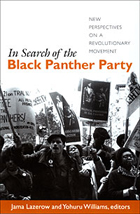
One contributor evaluates the legal basis of the Panthers’ revolutionary struggle, explaining how they utilized and critiqued the language of the Constitution. Others explore the roles of individuals, looking at a one-time Panther imprisoned for a murder he did not commit and an FBI agent who monitored the activities of the Panthers’ Oakland branch. Contributors assess the Panthers’ relations with Students for a Democratic Society, the Young Lords, the Brown Berets, and the Peace and Freedom Party. They discuss the Party’s use of revolutionary aesthetics, and they show how the Panthers manipulated and were manipulated by the media. Illuminating some of the complexities involved in placing the Panthers in historical context, this collection demonstrates that the scholarly search for the Black Panthers has only just begun.
Contributors. Bridgette Baldwin, Davarian L. Baldwin, David Barber, Rod Bush, James T. Campbell, Tim Lake, Jama Lazerow, Edward P. Morgan, Jeffrey O. G. Ogbar, Roz Payne, Robert O. Self, Yohuru Williams, Joel Wilson


In a serious effort to divine the secret of the West's success in achieving wealth and power, Yen Fu, a Chinese thinker, undertook, at the turn of the century, years of laborious translation and commentary on the work of such thinkers as Spencer, Huxley, Adam Smith, Mill, and Montesquieu. In addition to the inevitable difficulties involved in translating modern English into classical Chinese, Yen Fu was faced with the formidable problem of interpreting and making palatable many Western ideas which were to a large extent antithetical to traditional Chinese thought.
In an absorbing study of Yen Fu's translations, essays, and commentaries, Benjamin Schwartz examines the modifications and consequent revaluation of these familiar works as they were presented to their new audience, and analyzes the impact of this Western thought on the Chinese culture of the time. Drawing on a unique knowledge of both intellectual traditions, Schwartz describes the diverse and complex effects of this confrontation of Eastern and Western philosophies and provides a new vantage point to assess and appreciate these two disparate worlds.
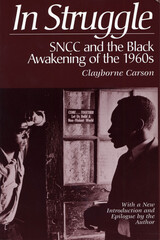
With its radical ideology and effective tactics, the Student Nonviolent Coordinating Committee (SNCC) was the cutting edge of the civil rights movement during the 1960s. This sympathetic yet evenhanded book records for the first time the complete story of SNCC’s evolution, of its successes and its difficulties in the ongoing struggle to end white oppression.
At its birth, SNCC was composed of black college students who shared an ideology of moral radicalism. This ideology, with its emphasis on nonviolence, challenged Southern segregation. SNCC students were the earliest civil rights fighters of the Second Reconstruction. They conducted sit-ins at lunch counters, spearheaded the freedom rides, and organized voter registration, which shook white complacency and awakened black political consciousness. In the process, Clayborne Carson shows, SNCC changed from a group that endorsed white middle-class values to one that questioned the basic assumptions of liberal ideology and raised the fist for black power. Indeed, SNCC’s radical and penetrating analysis of the American power structure reached beyond the black community to help spark wider social protests of the 1960s, such as the anti–Vietnam War movement.
Carson’s history of SNCC goes behind the scene to determine why the group’s ideological evolution was accompanied by bitter power struggles within the organization. Using interviews, transcripts of meetings, unpublished position papers, and recently released FBI documents, he reveals how a radical group is subject to enormous, often divisive pressures as it fights the difficult battle for social change.

REVISED AND EXPANDED EDITION
Reveals the multiple independent political tactics and strategies that African Americans have used to expand democracy and uphold civil and political rights since the founding of the nation.
This new edition of Ali’s groundbreaking narrative includes an epilogue by independent political analyst and leader Jacqueline Salit. New material addresses the historic presidencies of both Barack Obama and Donald Trump, as well as the rising tide of independent and anti-party sentiments.
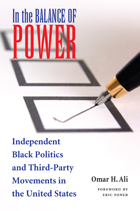
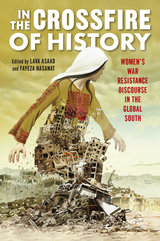
The transformative mode of these examples expands the definition of heroism and defiance. To prevent these types of heroism from slipping into the abyss of history, this collection brings forth and celebrates women’s fortitude in conflict zones. In the Crossfire of History shines a light onwomen across the globe who are resisting the sociopolitical and economic injustices in their nation-states.
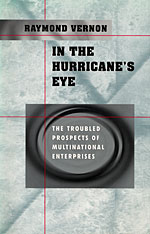
The world’s multinational enterprises face a spell of rough weather, political economist Ray Vernon argues, not only from the host countries in which they have established their subsidiaries, but also from their home countries. Such enterprises—a few thousand in number, including Microsoft, Toyota, IBM, Siemens, Samsung, and others—now generate about half of the world’s industrial output and half of the world’s foreign trade; so any change in the relatively benign climate in which they have operated over the past decade will create serious tensions in international economic relations.
The warnings of such a change are already here. In the United States, interests such as labor are increasingly hostile to what they see as the costs and uncertainties of an open economy. In Europe, those who want to preserve the social safety net and those who feel that the net must be dismantled are increasingly at odds. In Japan, the talk of “hollowing out” takes on a new urgency as the country’s “lifetime employment” practices are threatened and as public and private institutions are subjected to unaccustomed stress. The tendency of multinationals in different countries to find common cause in open markets, strong patents and trademarks, and international technical standards has been viewed as a loss of national sovereignty and a weakening of the nation-state system, producing hostile reactions in home countries.
The challenge for policy makers, Vernon argues, is to bridge the quite different regimes of the multinational enterprise and the nation-state. Both have a major role to play, and yet must make basic changes in their practices and policies to accommodate each other.

Interspersed with vignettes from the author's own experiences and political activism, In the Land of Mirrors explores the meanings and ramifications of exile, of belonging, and of seeing the self in the other. It will appeal to political scientists, Latin Americanists, and those studying the politics of exile.
María de los Angeles Torres was born in Cuba and came to the United States as a young child. She is Associate Professor of Political Science, DePaul University.
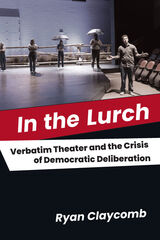
But this is not just a disinterested history—Claycomb reflects on his own participation in that political fantasy, including earlier scholarly writing that articulated with breathless hopefulness the potential of verbatim theater, and on his own theatrical attendance, imbued with a belief that witnessing this idealized public sphere was a substitute for actual public participation. In the Lurch also recounts the bumpy path towards its completion, two years marked by presidential impeachments, an insurrection, a national reckoning with racism, and a global pandemic. At the heart of the book is a central question: is verbatim theater any longer an effective cultural response to what can look like the possible end of democracy?

Though the war on terrorism is said to have generated unprecedented military situations, arguments for the Patriot Act and military tribunals following 9/11 resemble many historical claims for restricting civil liberties, more often than not in the name of necessity.
Marouf Hasian Jr. examines the major legal cases that show how various generations have represented the need for military tribunals, and how officials historically have applied the term “necessity.” George Washington cited the necessity of martial discipline in executing the British operative Major André. Tribunals tried and convicted more than 200 Sioux warriors during the Dakota Wars. President Lincoln suspended habeas corpus for many civilian and military prisoners during the Civil War. Twentieth Century military and civilian leaders selectively drafted their own codes, leading to the execution of German saboteurs during World War II. Further, General MacArthur’s tribunal to investigate the wartime activities of Japanese General Yamashita raised the specter of “victor’s justice,” anticipating the outcry that attended the Nuremberg trials.
In those cases as in current debates about the prosecution of terrorists, Hasian argues that the past is often cited selectively, neglecting historical contexts and the controversies these cases engendered.

International terrorism expert Roland Jacquard’s In the Name of Osama bin Laden presents a dramatic portrait of the world's most wanted terrorist and his extensive brotherhood--the network of people who operate “in his name.” Published originally in France the very week of September 11, as events in the United States shook the world, the book has become an international bestseller.
Jacquard details how bin Laden became an international emblem of fundamentalist, pan-Islamic, anti-U.S. fervor and the leader of a brotherhood so passionate that devotees who have never met him will act autonomously in his name. The author explains the global character of bin Laden’s organization, elaborating the extent of his sphere of influence in Europe and Asia. Jacquard reveals the construction of bin Laden’s networks—including a profile of his inner circle—and their collaboration with overlapping webs of banking, drug trafficking, religious, and terrorist organizations. He considers the brotherhood’s access to biological, chemical, and nuclear weapons and warns that, with or without bin Laden, this global terrorist force will remain a threat.
Now in English, this edition has been substantially updated in light of recent world events and expanded to include previously unpublished materials, featuring a new introduction and afterword. New documents include an April 2001 interview by the author with bin Laden; a September 24 proclamation by bin Laden to Muslims in Pakistan; and a key page from Dr. Ayman al-Zawahiri’s book justifying eternal jihad, which was smuggled out of Afghanistan in October 2001.
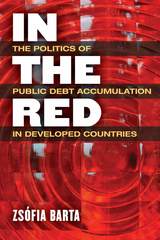

The sociologist Thomas Sowell writes, "We need to confront the most blatant fact that has persisted across centuries of social history—vast ddifferences in productivity among peoples, and the economic and other consequences of such differences." Poverty demeans dignity, shrinks the soul, wastes potential, and inflicts suffering on three billion people on our planet. We must also acknowledge that, during the past fifty yyears, the record in international assistance to the least developed countries has been disappointing; the economics-based abstractions developed in the think tanks of Europe and North America are insufficient.
In the River They Swim is the antithesis of that search for solutions to the next big theory of global poverty. From the fresh perspective of advisors on the frontlines of development to the insight of leaders like President Paul Kagame of Rwanda and Pastor Rick Warren, it tells the story of change in the microcosms of emerging businesses, industries, and governments. These essays display a personal nature to their work that rigorous analysis alone cannot explain.
We learn that a Sufi master can teach us about the different levels of knowledge, the "different ways to know a river." These practitioners could have written about its length, its source, its depth, its width, the power of its current, and the life it contains. They could have invested time and money to travel to that river so that they could sit on its shores and look at it, feel the sand that borders it, and watch the birds at play over it. Instead, they dove in to swim in the river, felt its current along their bodies, and tasted something of it. They wondered, briefly, if they had the strength to swim its length, and now they share the answer.
If human development is a river, the authors in this volume, and perhaps some readers, will no longer be satisfied to stand along its banks.
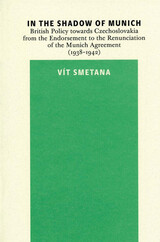

Victoria Hattam locates the origins of ethnicity in the New York Zionist movement of the early 1900s. In a major revision of widely held assumptions, she argues that Jewish activists identified as ethnics not as a means of assimilating and becoming white, but rather as a way of defending immigrant difference as distinct from race—rooted in culture rather than body and blood. Eventually, Hattam shows, the Immigration and Naturalization Service and the Census Bureau institutionalized this distinction by classifying Latinos as an ethnic group and not a race. But immigration and the resulting population shifts of the last half century have created a political opening for reimagining the relationship between immigration and race. How to do so is the question at hand.
In the Shadow of Race concludes by examining the recent New York and Los Angeles elections and the 2006 immigrant rallies across the country to assess the possibilities of forging a more robust alliance between immigrants and African Americans. Such an alliance is needed, Hattam argues, to more effectively redress the persistent inequalities in American life.

In the twenty years since the dissolution of the Soviet Union, the fifteen new independent republics have embarked on unprecedented transitions from command economies into market-oriented economies.
Important motivating factors for their reform efforts included issues of geographic and economic proximity to Europe and the influence of the pre-Soviet era histories in those countries. In the Shadow of Russia builds upon the conceptual frameworks that include geography and policy choices about economic integration in an analysis of the reform efforts of Kazakhstan and Uzbekistan.
Blackmon's book addresses such central questions as: How and in what areas has a republic's previous level of integration with Soviet-era Russia influenced its present economic orientation? What are the contributing factors that explain the differences in how leaders ( of a similar regime type) developed economic reform policies? To answer these questions, the author utilizes information from both the economic and the political literature on post-communist transitions, as well from political speeches.
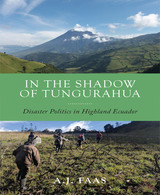

As civil wars and insurgencies rage around the globe, Klaus Schlichte’s In the Shadow of Violence addresses a crucial question: why do some groups succeed in violently seizing and holding power while others fail? What makes for a successful non-state armed force? Arguing that success rests on the ability of these groups to transform the power of violence into legitimate domination, both inside their ranks and in the larger society, Schlichte explores the techniques and strategies they employ—and the long shadow of violence they must overcome along the way.
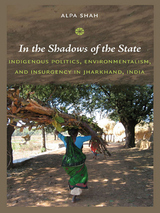
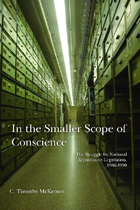
In 1989, The National Museum of the American Indian Act (NMAIA) was successfully passed after a long and intense struggle. One year later, the Native American Graves Protection and Repatriation Act (NAGPRA) followed. These federal repatriation statutes—arguably some of the most important laws in the history of anthropology, museology, and American Indian rights—enabled Native Americans to reclaim human remains, funerary objects, sacred objects, and objects of cultural patrimony.
Twenty years later, the controversy instigated by the creation of NMAIA and NAGPRA continues to simmer. In the Smaller Scope of Conscience is a thoughtful and detailed study of the ins and outs of the four-year process behind these laws. It is a singular contribution to the history of these issues, with the potential to help mediate the ongoing debate by encouraging all sides to retrace the steps of the legislators responsible for the acts.
Few works are as detailed as McKeown’s account, which looks into bills that came prior to NMAIA and NAGPRA and combs the legislative history for relevant reports and correspondence. Testimonies, documents, and interviews from the primary players of this legislative process are cited to offer insights into the drafting and political processes that shaped NMAIA and NAGPRA.
Above all else, this landmark work distinguishes itself from earlier legislative histories with the quality of its analysis. Invested and yet evenhanded in his narrative, McKeown ensures that this journey through history—through the strategies and struggles of different actors to effect change through federal legislation—is not only accurate but eminently intriguing.
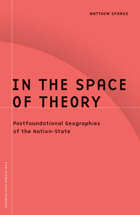
In the Space of Theory details the territorial implications of the Iraq war, NAFTA, welfare reform, constitutional reform, cross-border regional development, and the legal battles of First Nations. In using antiessentialist arguments to elucidate the complexity of these developments, Sparke seeks to ground and critique postfoundational theory itself. He shows how the postfoundational arguments of Homi Bhabha, Arjun Appadurai, Timothy Mitchell, Ernesto Laclau, Chantal Mouffe, Michael Hardt, and Antonio Negri obscure politically important processes of reterritorialization at the same time they deterritorialize diverse theoretical assumptions about the nation-state. Engaged with theory and grounded in close study of cultural, political, and economic change, In the Space of Theory explores the geographies of struggle that at once underlie and undermine the hyphen in contemporary nation-states.
Matthew Sparke is associate professor of geography and international studies at the University of Washington.

In a timely book with a powerful and persuasive message, Dr. Harold G. Koenig addresses federal, state, and local government policy leaders, urging them to more fully integrate religious organizations into the formal disaster response system, and he then provides recommendations on how this can effectively be done. Koenig also advocates faith communities and organizations to learn more about the role they can play in responding to disasters and terrorism.
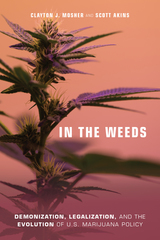
More and more states are legalizing marijuana in some form. Moreover, a majority of the U.S. population is in favor of the drug for recreational use. In the Weeds looks at how our society has become more permissive in the past 150 years—even though marijuana is still considered a Schedule I drug by the American government.
Sociologists Clayton Mosher and Scott Akins take a deep dive into marijuana policy reform, looking at the incremental developments and the historical, legal, social, and political implications of these changes. They investigate the effects, medicinal applications, and possible harms of marijuana. In the Weeds also considers arguments that youth will be heavy users of legalized cannabis, and shows how “weed” is demonized by exaggerations of the drug’s risks and claims of its lack of medicinal value. Mosher and Akins end their timely and insightful book by tracing the distinct paths to the legalization of recreational marijuana in the United States and other countries as well as discussing what the future of marijuana law holds.
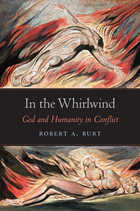
God deserves obedience simply because he’s God—or does he? Inspired by a passion for biblical as well as constitutional scholarship, in this bold exploration Yale Law Professor Robert A. Burt conceptualizes the political theory of the Hebrew and Christian Bibles. God’s authority as expressed in these accounts is not a given. It is no less inherently problematic and in need of justification than the legitimacy of secular government.
In recounting the rich narratives of key biblical figures—from Adam and Eve to Noah, Cain, Abraham, Moses, Job, and Jesus—In the Whirlwind paints a surprising picture of the ambivalent, mutually dependent relationship between God and his peoples. Taking the Hebrew and Christian Bibles as a unified whole, Burt traces God’s relationship with humanity as it evolves from complete harmony at the outset to continual struggle. In almost every case, God insists on unconditional obedience, while humanity withholds submission and holds God accountable for his promises.
Contemporary political theory aims for perfect justice. The Bible, Burt shows, does not make this assumption. Justice in the biblical account is an imperfect process grounded in human—and divine—limitation. Burt suggests that we consider the lessons of this tension as we try to negotiate the power struggles within secular governments, and also the conflicts roiling our public and private lives.
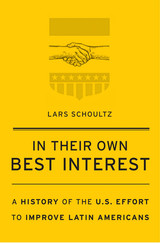
Winner of the William M. LeoGrande Prize
For over a century, the United States has sought to improve the behavior of the peoples of Latin America. Perceiving their neighbors to the south as underdeveloped and unable to govern themselves, U.S. policy makers have promoted everything from representative democracy and economic development to oral hygiene. But is improvement a progressive impulse to help others, or realpolitik in pursuit of a superpower’s interests?
“In this subtle and searing critique of U.S. efforts to ‘uplift’ Latin America, Lars Schoultz challenges us to question the fundamental tenets of the development industry that became entrenched in the U.S. foreign policy bureaucracy over the last century.”
—Piero Gleijeses, author of Visions of Freedom
“In this masterful work, Lars Schoultz provides a companion and follow-up to his classic Beneath the United States…A necessary and rewarding read for scholars and students of U.S. foreign policy and inter-American relations.”
—Renata Keller, The Americas

From World War II to the war in Iraq, periods of international conflict seem like unique moments in U.S. political history—but when it comes to public opinion, they are not. To make this groundbreaking revelation, In Time of War explodes conventional wisdom about American reactions to World War II, as well as the more recent conflicts in Korea, Vietnam, the Gulf, Afghanistan, and Iraq. Adam Berinsky argues that public response to these crises has been shaped less by their defining characteristics—such as what they cost in lives and resources—than by the same political interests and group affiliations that influence our ideas about domestic issues.
With the help of World War II–era survey data that had gone virtually untouched for the past sixty years, Berinsky begins by disproving the myth of “the good war” that Americans all fell in line to support after the Japanese bombed Pearl Harbor. The attack, he reveals, did not significantly alter public opinion but merely punctuated interventionist sentiment that had already risen in response to the ways that political leaders at home had framed the fighting abroad. Weaving his findings into the first general theory of the factors that shape American wartime opinion, Berinsky also sheds new light on our reactions to other crises. He shows, for example, that our attitudes toward restricted civil liberties during Vietnam and after 9/11 stemmed from the same kinds of judgments we make during times of peace.
With Iraq and Afghanistan now competing for attention with urgent issues within the United States, In Time of War offers a timely reminder of the full extent to which foreign and domestic politics profoundly influence—and ultimately illuminate—each other.

The definitive account of the career and legacy of the most influential Western exponent of violent jihad.
Anwar al-Awlaki was, according to one of his followers, “the main man who translated jihad into English.” By the time he was killed by an American drone strike in 2011, he had become a spiritual leader for thousands of extremists, especially in the United States and Britain, where he aimed to make violent Islamism “as American as apple pie and as British as afternoon tea.” Alexander Meleagrou-Hitchens draws on extensive research among al-Awlaki’s former colleagues, friends, and followers, including interviews with convicted terrorists, to explain how he established his network and why his message resonated with disaffected Muslims in the West.
A native of New Mexico, al-Awlaki rose to prominence in 2001 as the imam of a Virginia mosque attended by three of the 9/11 hijackers. After leaving for Britain in 2002, he began delivering popular lectures and sermons that were increasingly radical and anti-Western. In 2004 he moved to Yemen, where he eventually joined al-Qaeda and oversaw numerous major international terrorist plots. Through live video broadcasts to Western mosques and universities, YouTube, magazines, and other media, he soon became the world’s foremost English-speaking recruiter for violent Islamism. One measure of his success is that he has been linked to about a quarter of Islamists convicted of terrorism-related offenses in the United States since 2007.
Despite the extreme nature of these activities, Meleagrou-Hitchens argues that al-Awlaki’s strategy and tactics are best understood through traditional social-movement theory. With clarity and verve, he shows how violent fundamentalists are born.

Inclusion conjures images of children with special educational needs and disabilities (SEND) learning in classes alongside peers in a mainstream school. For pupils in the UK with high-level SEND, who have an Education, Health and Care Plan (formerly a Statement), this implies an everyday educational experience similar to that of their typically developing classmates. Yet in vital respects, they are worlds apart.
Based on the UK’s largest observation study of pupils with high-level SEND, this book exposes how attendance at a mainstream school is no guarantee of receiving a mainstream education. Observations of nearly 1,500 lessons in English schools show that these students’ everyday experience of school is characterized by separation and segregation. Furthermore, interviews with nearly five hundred pupils, parents, and school staff reveal the effect of this marginalization on the quality of their education. The book argues that inclusion is an illusion. The way schools are organized and how classrooms are composed creates a form of structural exclusion that preserves mainstream education for typically developing pupils and justifies offering a diluted pedagogy for pupils with high-level SEND. Ultimately, the book suggests why a more authentic form of inclusion is needed, and how it might be achieved.

In the early 1990s, South Korea was showcased as a country that had combined extraordinary economic growth with a narrowing of income distribution, achieving remarkably low rates of unemployment and poverty. In the years following the financial crisis of 1997–1998, however, these rates ballooned to pre-crisis levels, giving rise to the perception that the gap between the rich and the poor in Korea had once again widened.
Income Inequality in Korea explores the relationship between economic growth and social developments in Korea over the last three decades. Analyzing the forces behind the equalizing trends in the 1980s and early 1990s, and the deterioration evident in the post-crisis years, Chong-Bum An and Barry Bosworth investigate the macroeconomic conditions, gains in educational attainment, demographic changes and conditions in labor markets, and social welfare policies that have contributed to the evolution of income inequality over time.
The authors also raise fundamental questions about whether the pre-crisis pattern of combining strong economic growth with improving equality can be restored, as well as how government policies might be designed to promote that objective. The book concludes with a discussion of some proposals for improving the efficacy of redistributive policies in Korea.
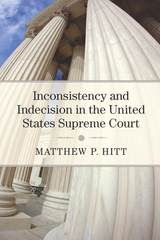
Yet a Court that prioritizes resolving many disputes will at times produce contradictory sets of opinions or fail to provide a rationale and legal precedent for its decision at all. In either case, it produces an unreasoned judgment. Conversely, a Court that prioritizes logically consistent doctrine will fail to resolve many underlying disputes in law and society. Inconsistency and Indecision in the United States Supreme Court demonstrates that over time, institutional changes, lobbied for by the justices, substantially reduced unreasoned judgments in the Court’s output, coinciding with a reduction in the Court’s caseload. Hence, the Supreme Court historically emphasized the first goal of dispute resolution, but evolved into a Court that prioritizes the second goal of logically consistent doctrine. As a result, the Court today fails to resolve more underlying questions in law and society in order to minimize criticism of its output from other elites. In so doing, the modern Court often fails to live up to its Constitutional obligation.
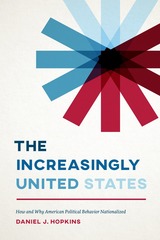
With The Increasingly United States, Daniel J. Hopkins explores this trend and its implications for the American political system. The change is significant in part because it works against a key rationale of America’s federalist system, which was built on the assumption that citizens would be more strongly attached to their states and localities. It also has profound implications for how voters are represented. If voters are well informed about state politics, for example, the governor has an incentive to deliver what voters—or at least a pivotal segment of them—want. But if voters are likely to back the same party in gubernatorial as in presidential elections irrespective of the governor’s actions in office, governors may instead come to see their ambitions as tethered more closely to their status in the national party.

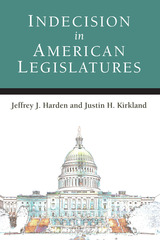
Lawmaking provides many opportunities for proposals to be altered, amended, tabled, or stopped completely. The ideal legislator should assess evidence, update his or her beliefs with new information, and sometimes be willing to change course. In practice, however, lawmakers face criticism from the media, the public, and their colleagues for “flip-flopping.” Legislators may also only appear to change positions in some cases as a means of voting strategically.
This book presents a systematic examination of legislative indecision in American politics. This might occur via “waffling”—where a legislator cosponsors a bill, then votes against it at roll call. Or it might occur when a legislator votes one way on a bill, then switches her vote to the other side. In Indecision in American Legislatures, Jeffrey J. Harden and Justin H. Kirkland develop a theoretical framework to explain indecision itself, as well as the public’s attitudes toward indecision. They test their expectations with data sources from American state legislatures, the U.S. Congress, and survey questions administered to American citizens. Understanding legislative indecision from both the legislator and citizen perspectives is important for discussions about the quality of representation in American politics.

The untold history of how America’s student-loan program turned the pursuit of higher education into a pathway to poverty.
It didn’t always take thirty years to pay off the cost of a bachelor’s degree. Elizabeth Tandy Shermer untangles the history that brought us here and discovers that the story of skyrocketing college debt is not merely one of good intentions gone wrong. In fact, the federal student loan program was never supposed to make college affordable.
The earliest federal proposals for college affordability sought to replace tuition with taxpayer funding of institutions. But Southern whites feared that lower costs would undermine segregation, Catholic colleges objected to state support of secular institutions, professors worried that federal dollars would come with regulations hindering academic freedom, and elite-university presidents recoiled at the idea of mass higher education. Cold War congressional fights eventually made access more important than affordability. Rather than freeing colleges from their dependence on tuition, the government created a loan instrument that made college accessible in the short term but even costlier in the long term by charging an interest penalty only to needy students. In the mid-1960s, as bankers wavered over the prospect of uncollected debt, Congress backstopped the loans, provoking runaway inflation in college tuition and resulting in immense lender profits.
Today 45 million Americans owe more than $1.5 trillion in college debt, with the burdens falling disproportionately on borrowers of color, particularly women. Reformers, meanwhile, have been frustrated by colleges and lenders too rich and powerful to contain. Indentured Students makes clear that these are not unforeseen consequences. The federal student loan system is working as designed.

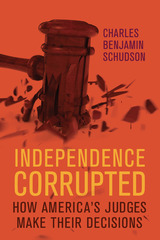
As political attacks on judges increase, Schudson calls for reforms to protect judicial independence and for vigilance to ensure justice for all. Independence Corrupted is invaluable for students and scholars, lawyers and judges, and all citizens concerned about the future of America's courts.

"My intention [is] to provide a frank criticism of the British colonial legacies to countries which I have come to love and admire and a sincere unsycophantic tribute to those who are now struggling with the problems flowing from these legacies."
In this book, an expanded version of The Oliver Wendell Holmes Lectures he delivered at Harvard University in 1966, Mr. Gower first looks at some of the legacies of colonialism inherited by those nations of Tropical Africa which recently gained independence from Britain: Nigeria, Ghana, Sierra Leone, The Gambia, Kenya, Uganda, and Tanzania. These various legacies include arbitrary national boundaries imposed long before independence; British-style education, government, civil service, military forces, and police; respect for the rule of law (and a residual contempt for it as a result of colonial associations); underdeveloped and unbalanced economies; hostility toward the West, including American "dollar-imperialism," and a hypersensitivity to criticism from that quarter.
Mr. Gower continues with an assessment of what has happened to these legacies since independence and what seems likely to happen to them in the next few decades. His central concern is the challenge thus implied for the indigenous legal professions, but his study has far wider implications.
In conclusion Mr. Gower describes how the legal professions were organized at the time of independence in the various countries and what progress has been made in producing the kinds of lawyers needed to solve the urgent problems these countries face. He suggests what the United States can and should-and occasionally what it should not-do to help.
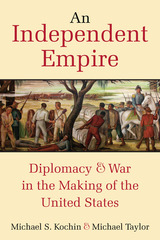
Foreign policies and diplomatic missions, combined with military action, were the driving forces behind the growth of the early United States. In an era when the Old and New Worlds were subject to British, French, and Spanish imperial ambitions, the new republic had limited diplomatic presence and minimal public credit. It was vulnerable to hostile forces in every direction. The United States could not have survived, grown, or flourished without the adoption of prescient foreign policies, or without skillful diplomatic operations.
An Independent Empire shows how foreign policy and diplomacy constitute a truly national story, necessary for understanding the history of the United States. In this lively and well-written book, episodes in American history—such as the writing and ratification of the Constitution, Henry Clay’s advocacy of an American System, Pinckney’s Treaty with Spain, and the visionary but absurd Congress of Panama—are recast as elemental aspects of United States foreign and security policy.
An Independent Empire tells the stories of the people who defined the early history of America’s international relationships. Throughout the book are brief, entertaining vignettes of often-overlooked intellectuals, spies, diplomats, and statesmen whose actions and decisions shaped the first fifty years of the United States. More than a dozen bespoke maps illustrate that the growth of the early United States was as much a geographical as a political or military phenomenon.
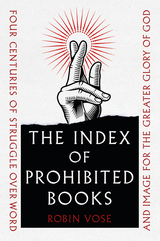
For more than four hundred years, the Catholic Church’s Index Librorum Prohibitorum struck terror into the hearts of authors, publishers, and booksellers around the world, while arousing ridicule and contempt from many others, especially those in Protestant and non-Christian circles. Biased, inconsistent, and frequently absurd in its attempt to ban objectionable texts of every conceivable description—with sometimes fatal consequences—the Index also reflected the deep learning and careful consideration of many hundreds of intellectual contributors over the long span of its storied evolution. This book constitutes the first full study of the Index of Prohibited Books to be published in English. It examines the reasons behind the Church’s attempts to censor religious, scientific, and artistic works, and considers not only why this most sustained of campaigns failed, but what lessons can be learned for today’s debates over freedom of expression and cancel culture.

India's nuclear profile, doctrine, and practices have evolved rapidly since the country’s nuclear breakout in 1998. However, the outside world's understanding of India's doctrinal debates, forward-looking strategy, and technical developments are still two decades behind the present. India and Nuclear Asia will fill that gap in our knowledge by focusing on the post-1998 evolution of Indian nuclear thought, its arsenal, the triangular rivalry with Pakistan and China, and New Delhi's nonproliferation policy approaches. Yogesh Joshi and Frank O'Donnell show how India's nuclear trajectory has evolved in response to domestic, regional, and global drivers.
The authors argue that emerging trends in all three states are elevating risks of regional inadvertent and accidental escalation. These include the forthcoming launch of naval nuclear forces within an environment of contested maritime boundaries; the growing employment of dual-use delivery vehicles; and the emerging preferences of all three states to employ missiles early in a conflict. These dangers are amplified by the near-absence of substantive nuclear dialogue between these states, and the growing ambiguity of regional strategic intentions.
Based on primary-source research and interviews, this book will be important reading for scholars and students of nuclear deterrence and India's international relations, as well as for military, defense contractor, and policy audiences both within and outside South Asia.
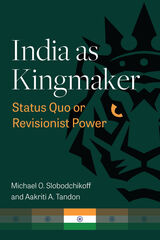
As India finds itself in the envious position of kingmaker, both the status quo and revisionist major powers are jockeying for India’s support for either upholding or revising the current world order. Using India’s bilateral treaties as a proxy measure of the strength of its relationship with other major powers, Slobodchikoff and Tandon determine whether India will remain neutral in its foreign policy approach or adopt a more assertive role in shaping the future global order. This book provides an in-depth analysis of India’s bilateral ties with major powers that include the United States, Russia, China, Japan, as well as the European Union (including the United Kingdom, France, and Germany) and uses network analysis to study India’s foreign policy positions with other major powers.
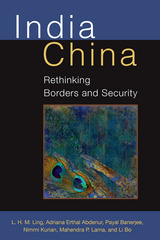
Challenging the Westphalian view of international relations, which focuses on the sovereignty of states and the inevitable potential for conflict, the authors from the Borderlands Study Group reconceive borders as capillaries enabling the flow of material, cultural, and social benefits through local communities, nation-states, and entire regions. By emphasizing local agency and regional interdependencies, this metaphor reconfigures current narratives about the China India border and opens a new perspective on the long history of the Silk Roads, the modern BCIM Initiative, and dam construction along the Nu River in China and the Teesta River in India.
Together, the authors show that positive interaction among people on both sides of a border generates larger, cross-border communities, which can pressure for cooperation and development. India China offers the hope that people divided by arbitrary geo-political boundaries can circumvent race, gender, class, religion, and other social barriers, to form more inclusive institutions and forms of governance.
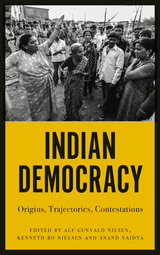
India’s pluralism has always posed a formidable challenge to its democracy, with many believing that a clash of identities based on region, language, caste, religion, ethnicity, and tribe would bring about its demise. With the meteoric rise to power of the Bharatiya Janata Party, the nation’s solidity is once again called into question: is Modi’s Hindu majoritarianism an anti-democratic attempt to transform India into a monolithic Hindu nation from which minorities and dissidents are forcibly excluded?
With examinations of the way that class and caste power shaped the making of India’s postcolonial democracy, the role of feminism, the media, and the public sphere in sustaining and challenging democracy, this book interrogates the contradictions at the heart of the Indian democratic project, examining its origins, trajectories, and contestations.

The Indian Ocean, with its critical routes for global commerce, is a potentially volatile location for geopolitical strife. Even as the region’s role in the international economy and as a highway to conflict zones increases, the US has failed to advance a coherent strategy for protecting its interests in the Indian Ocean or for managing complex diplomatic relationships across the region. The Indian Ocean and US Grand Strategy presents a range of viewpoints about whether and how the US should alter its diplomatic and military strategies for this region.
Contributors examine US interests in the Indian Ocean, assess the relative critical importance or imperiled nature of these interests, and propose solutions for American strategy ranging from minimal change to maximum engagement. The book concludes with a comparative assessment of these options and a discussion of their implications for US policymakers. This volume’s perspectives and analysis of the Indian Ocean region will be valued by scholars and students of US foreign policy, South Asia, and security studies as well as by diplomats, military officers, and other practitioners.

Informed by both historical research and extensive fieldwork, this book pays special attention to the natural resource base and economic outlook of the reservations, as well as the crucial issue of tribal sovereignty. Chapters also cover the demography of American Indian groups and their socioeconomic status (including standard of living, employment, and education). A new afterword treats some of the developments since the book's initial publication in German, such as the effects of the 1988 Indian gaming law that allowed Indian reservations to operate gambling establishments (with mixed success).
"Provides a good overview of the basic questions and problems facing reservation Indians today."—Peter Bolz, Journal of American History (on the German edition)


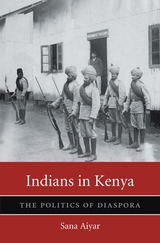
Working as merchants, skilled tradesmen, clerks, lawyers, and journalists, Indians formed the economic and administrative middle class in colonial Kenya. In general, they were wealthier than Africans, but were denied the political and economic privileges that Europeans enjoyed. Moreover, despite their relative prosperity, Indians were precariously positioned in Kenya. Africans usually viewed them as outsiders, and Europeans largely considered them subservient. Indians demanded recognition on their own terms. Indians in Kenya chronicles the competing, often contradictory, strategies by which the South Asian diaspora sought a political voice in Kenya from the beginning of colonial rule in the late 1890s to independence in the 1960s.
Indians’ intellectual, economic, and political connections with South Asia shaped their understanding of their lives in Kenya. Sana Aiyar investigates how the many strands of Indians’ diasporic identity influenced Kenya’s political leadership, from claiming partnership with Europeans in their mission to colonize and “civilize” East Africa to successful collaborations with Africans to battle for racial equality, including during the Mau Mau Rebellion. She also explores how the hierarchical structures of colonial governance, the material inequalities between Indians and Africans, and the racialized political discourses that flourished in both colonial and postcolonial Kenya limited the success of alliances across racial and class lines. Aiyar demonstrates that only by examining the ties that bound Indians to worlds on both sides of the Indian Ocean can we understand how Kenya came to terms with its South Asian minority.

Nishant Upadhyay unravels Indian diasporic complicity in its ongoing colonialist relationship with Indigenous peoples, lands, and nations in Canada. Upadhyay examines the interwoven and simultaneous areas of dominant Indian caste complicity in processes of settler colonialism, antiblackness, capitalism, brahminical supremacy, Hindu nationalism, and heteropatriarchy. Resource extraction in British Columbia in the 1970s–90s and in present-day Alberta offer examples of spaces that illuminate the dispossession of Indigenous peoples and simultaneously reveal racialized, gendered, and casted labor formations. Upadhyay juxtaposes these extraction sites with examples of anticolonial activism and solidarities from Tkaronto. Analyzing silence on settler colonialism and brahminical caste supremacy, Upadhyay upends the idea of dominant caste Indian diasporas as racially victimized and shows that claiming victimhood denies a very real complicity in enforcing other power structures. Exploring stories of quotidian proximity and intimacy between Indigenous and South Asian communities, Upadhyay offers meditations on anticolonial and anti-casteist ways of knowledge production, ethical relationalities, and solidarities.
Groundbreaking and ambitious, Indians on Indian Lands presents the case for holding Indian diasporas accountable for acts of violence within a colonial settler nation.
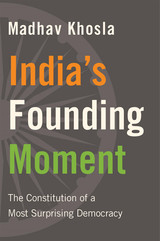
An Economist Best Book of the Year
How India’s Constitution came into being and instituted democracy after independence from British rule.
Britain’s justification for colonial rule in India stressed the impossibility of Indian self-government. And the empire did its best to ensure this was the case, impoverishing Indian subjects and doing little to improve their socioeconomic reality. So when independence came, the cultivation of democratic citizenship was a foremost challenge.
Madhav Khosla explores the means India’s founders used to foster a democratic ethos. They knew the people would need to learn ways of citizenship, but the path to education did not lie in rule by a superior class of men, as the British insisted. Rather, it rested on the creation of a self-sustaining politics. The makers of the Indian Constitution instituted universal suffrage amid poverty, illiteracy, social heterogeneity, and centuries of tradition. They crafted a constitutional system that could respond to the problem of democratization under the most inhospitable conditions. On January 26, 1950, the Indian Constitution—the longest in the world—came into effect.
More than half of the world’s constitutions have been written in the past three decades. Unlike the constitutional revolutions of the late eighteenth century, these contemporary revolutions have occurred in countries characterized by low levels of economic growth and education, where voting populations are deeply divided by race, religion, and ethnicity. And these countries have democratized at once, not gradually. The events and ideas of India’s Founding Moment offer a natural reference point for these nations where democracy and constitutionalism have arrived simultaneously, and they remind us of the promise and challenge of self-rule today.
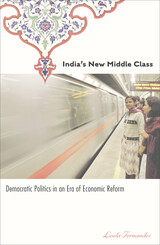

Sapna Thottathil calls on us to rethink the politics of organic food by focusing on what it means for the people who grow and sell it—what it means for their health, the health of their environment, and also their economic and political well-being. Taking readers to the state of Kerala in southern India, she shows us a place where the so-called “Green Revolution” program of hybrid seeds, synthetic fertilizers, and rising pesticide use had failed to reduce hunger while it caused a cascade of economic, medical, and environmental problems. Farmers burdened with huge debts from buying the new seeds and chemicals were committing suicide in troubling numbers. Farm laborers suffered from pesticide poisoning and rising rates of birth defects. A sharp fall in biodiversity worried environmental activists, and everyone was anxious about declining yields of key export crops like black pepper and coffee.
In their debates about how to solve these problems, farmers, environmentalists, and policymakers drew on Kerala’s history of and continuing commitment to grassroots democracy. In 2010, they took the unprecedented step of enacting a policy that requires all Kerala growers to farm organically by 2020. How this policy came to be and its immediate economic, political, and physical effects on the state’s residents offer lessons for everyone interested in agriculture, the environment, and what to eat for dinner. Kerala’s example shows that when done right, this kind of agriculture can be good for everyone in our global food system.

Gandhi's Quit India Movement of 1942 was the climax of a nationalist revolutionary movement which sought independence on India's own terms. Indian independence was attained through revolution, not through a benevolent grant from the British imperial regime. "The British left India because Indians had made it impossible for them to stay."
The bases for Francis Hutchins' thesis are new facts from hitherto unused sources: interviews with surviving participants in the movement, private papers from the Gandhi Memorial Museum and the Nehru Memorial Museum and Library, documents in the National Archives of India. In particular, he has studied the secret records of the British government, recently made available, which reveal for the first time the extent of the revolutionary movement and Britain's plans for dealing with it.
Of the British records Hutchins says, "No other regime has left such careful documentation of its strategies or compiled such extensive records revealing the way in which it was overthrown." Even though England had always proclaimed its hope that India would one day become independent, the tacit assumption was that this was a remote eventuality. Only after Gandhi's Quit India Movement did Britain's political parties resign themselves to the necessity to leave quickly, whether or not they believed India was "ready."
Obscured by censorship in India and by preoccupation with World War II, the significance of Gandhi's revolutionary technique was not appreciated at the time. Hutchins' impressive analysis uses the Indian case to develop a general theory of the revolutionary nature of colonial nationalism.
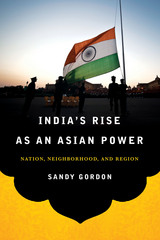
India’s Rise as an Asian Power examines India’s rise to power and the obstacles it faces in the context of domestic governance and security, relationships and security issues with its South Asian neighbors, and international relations in the wider Asian region. Instead of a straight-line projection based on traditional measures of power such as population size, economic growth rates, and military spending, Sandy Gordon’s nuanced view of India’s rise focuses on the need of any rising power to develop the means to deal with challenges in its domestic, neighborhood (South Asia), and regional (continental) spheres.
Terrorism, insurgency, border disputes, and water conflict and shortages are examples of some of India’s domestic and regional challenges. Gordon argues that before it can assume the mantle of a genuine Asian power or world power, India must improve its governance and security; otherwise, its economic growth and human development will continue to be hindered and its vulnerabilities may be exploited by competitors in its South Asian neighborhood or the wider region. This book will appeal to students and scholars of India and South Asia, security studies, foreign policy, and comparative politics, as well as country and regional specialists.

READERS
Browse our collection.
PUBLISHERS
See BiblioVault's publisher services.
STUDENT SERVICES
Files for college accessibility offices.
UChicago Accessibility Resources
home | accessibility | search | about | contact us
BiblioVault ® 2001 - 2024
The University of Chicago Press









